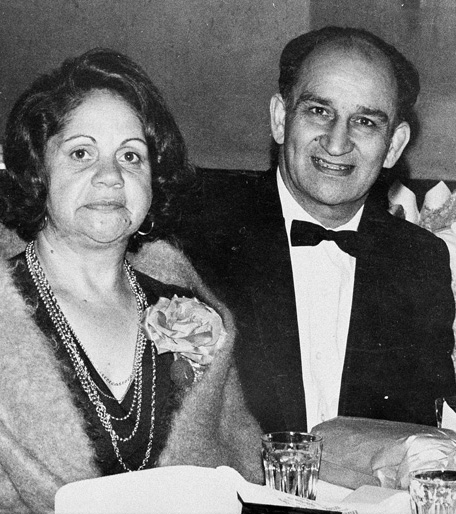Alick Jackomos
The son of Greek migrant parents, Alick Jackomos was born in Melbourne and grew up during the Great Depression. His parents owned a fish and chip shop and would give away meals to those in need, fostering in Alick a strong sense of community from an early age.
He had an active youth and learnt to box at the Exhibition Youth Club where he became friends with Aboriginal people in the area.
Alick had a keen sense of justice and at fifteen he rallied support for the Cummeragunja Walk Off – a protest against harsh conditions at the Cummeragunja Mission. He would later marry Yorta Yorta woman and activist Merle Morgan who grew up on the mission.
At age 17 he falsified his date of birth to join the army. Initially he was stationed at Morphett Creek in the Northern Territory where he was shocked by the living conditions of Aboriginal people in the region.

Family portrait of the Jackomos family, Alick and Merle with their three children Esmai, Michael and Andrew. AIATSIS Collection JACKOMOS.A04.BW-N03747_13a.
Family portrait of the Jackomos family, Alick and Merle with their three children Esmai, Michael and Andrew. AIATSIS Collection JACKOMOS.A04.BW-N03747_13a.
Following the Second World War, he joined a Jim Sharman’s travelling boxing troupe that performed at agricultural shows with other Sideshow Alley acts. These shows relied heavily on Aboriginal boxers and audiences, and Alick actively crossed cultural boundaries to associate with Aboriginal people when most of the population chose to shun them. Alick loved the lifestyle and for the next twenty years made lifelong friends.
In 1951 he married Merle and together they had three children, Esmai, Michael and Andrew.
Alick became Doug Nicholls’ apprentice in Aboriginal welfare and advocacy and throughout the 1960s he worked for the Federal Council for the Advancement of Aborigines and Torres Strait Islanders and the Australian Aborigines League (AAL). Despite being one of only two non-Aboriginal members, he was unanimously elected President of the AAL in 1963.
In the 1970s and 80s he joined the state and federal Department of Aboriginal Affairs working mainly in policy. Because of his strong ties to many Aboriginal communities, Alick was often a mediator between community members and the government and in 1971 he assisted in administering the land hand-back at Lake Tyers.
His commitment to the cause was, however, not without controversy. He was a non-Aboriginal man, with an Aboriginal family, living and moving in an Aboriginal world and working for Aboriginal rights.
Throughout his life Alick continued his grass roots community work delivering food and assisting Aboriginal parents to reunite with their children in foster care. An avid photographer, Alick collected a huge and remarkable photographic archive of Victorian Aboriginal people and compiled over a thousand intricate genealogies; some of this work was later used in land claim cases.
In 1985, he offered AIATSIS copies of his collection.
During his retirement Alick co-produced three books on Aboriginal history, Living Aboriginal History of Victoria, Forgotten Heroes and Sideshow Alley.
Universally acknowledged as a person of rare humanity, Alick was awarded an Order of Australia Medal in 1993 for his lifetime of work in Aboriginal affairs.
You can read more about his life in A man of all tribes by Richard Broome and Corrinne Manning.
Merle Jackomos OAM
Yorta Yorta woman and Aboriginal rights activist Aunty Merle Jackomos committed her life to improving the lives of Aboriginal people.
Born in June, 1929, Aunty Merle grew up on the Cummeragunja Mission near Echuca in New South Wales. Like many missions around Australia, conditions were often unbearable, and in 1939 about 170 residents walked off in protest.
Aunty Merle’s family were among those who stayed behind to safeguard the mission against it being sold; a decision that would pay off many years later when the land was finally returned to the Yorta Yorta people.
At age 16, Aunty Merle left the mission and settled in Melbourne where she met Alick Jackomos. Together, Aunty Merle and Alick became heavily involved with the Federal Council for the Advancement of Aborigines and Torres Strait Islanders and the Aborigines Advancement League. Both were active campaigners in the lead up to the 1967 Referendum which was one of the most successful campaigns in Australia’s history.
Aunty Merle worked tirelessly to bring about positive and practical change. Along with a small group of Victorian Aboriginal women, she lobbied tirelessly to establish a number of frontline services for Aboriginal people, including legal services, women’s refuge and health services, as well as Elders’ community services.
Aunty Merle also helped found the National Aboriginal and Islander Women's Council with Aunty Geraldine Briggs where she became the Victorian vice-president.
In 1972, she was elected to the Victorian Aboriginal Affairs Advisory Council and was later appointed a director of Aboriginal Hostels Ltd. In 1981, she was elected to the National Aboriginal Conference (NAC), a position she held until its abolition in 1985.
In her later years, Aunty Merle enjoyed her retirement surrounded by her children, grandchildren and great-grandchildren.
A woman of strength and substance, Aunty Merle’s remarkable contributions were recognised in 1987 with the Medal of the Order of Australia.
Information provided by Ms Esmai Manahan, daughter of Mrs Merle Jackomos OAM
